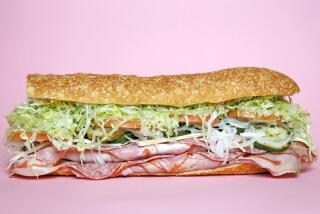Bread Labels on Wood Fiber Draw Attack
- Share via
WASHINGTON — Several brands of high-fiber bread are misleading consumers by failing to disclose that the source of the fiber is wood pulp, a consumer group charged Tuesday.
“Most consumers would be shocked to learn that the fiber in these breads comes from trees, not wheat grain,” said Bonnie Liebman of the Center for Science in the Public Interest.
The labels list “alpha cellulose” and do not state that the bread fiber comes from wood, Liebman said.
“Misleading? Go climb a tree,” responded Rella Dwyer, director of technical services at W. E. Long Co. in Chicago, maker of Vim, one of eight brands of bread cited by the consumer group.
‘Crude Fiber’ Listed
“Our label itself states, flat out, ‘non-nutritive crude fiber.’ That’s hardly misleading,” Dwyer said.
Dwyer said federal law requires labels to use the “common and usual name” of ingredients, and alpha cellulose is that correct term.
In addition to Vim, the nonprofit consumer advocacy group complained about similar labeling on Less, manufactured by Ort’s Inc. of Cumberland, Md.; Lite Loaf, Interstate Brands of Kansas City; Lite ‘n Up, Oroweat Foods Co. of Montebello, Calif.; Merita Lite, American Bakeries of New York; Roman Lite, Roman Meal Co. of Seattle, Wash.; Sunbeam Lite, Quality Bakers of Greenwich, Conn.; and 40, Grocers Baking Co. of Grand Rapids, Mich.
Liebman contended that “it is not clear whether wood fiber is as effective as natural food fiber in preventing health problems like colon cancer and constipation.”
Consumer Preferences
The breads are marketed as high fiber and reduced calorie products at a time when the public is increasingly seeking foods that help cut calories and increase fiber for health reasons.
Replacing some of the flour in a bread with cellulose, which has no calories, accomplishes both aims, increasing fiber and lowering the calorie content of the product.
Fiber, whether from wood or other sources, is beneficial to health, responded Lewis Ort, president of the Cumberland, Md., bakery. Other companies contacted defended their breads and their labels, saying they were not trying to mislead consumers.
The wood pulp issue surfaced once before, in the mid-1970s, in the case of Fresh Horizons bread. At that time the Federal Trade Commission required the manufacturer to list wood pulp on its labels.
More to Read
Eat your way across L.A.
Get our weekly Tasting Notes newsletter for reviews, news and more.
You may occasionally receive promotional content from the Los Angeles Times.










